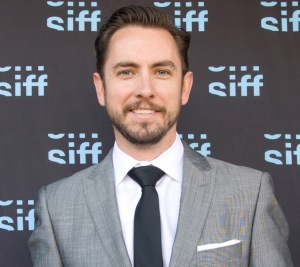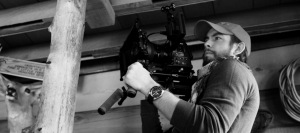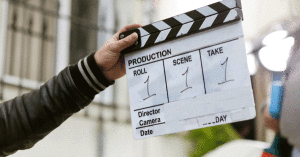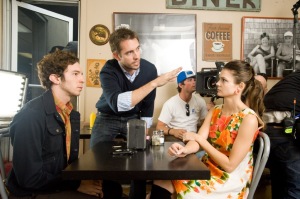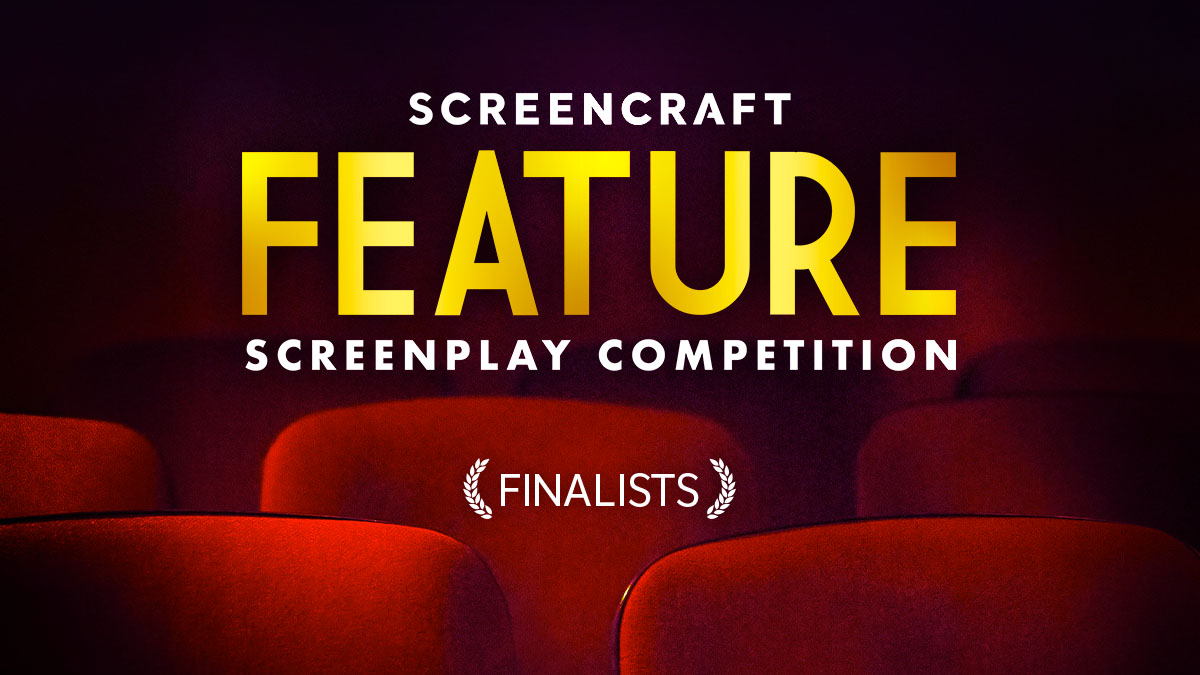Ten Questions with Layover Writer/Director Joshua Caldwell

Joshua Caldwell is an MTV Movie Award winning director, writer, and producer. He has worked with a number of high-profile producers, including CSI: creator Anthony E. Zuiker. His award-winning short film Dig, starring Mark Margolis of Breaking Bad, was featured in numerous film festivals and his Superman fan fiction short film Resignation screened at Comic-Con 2014. LAYOVER had its World Premiere at the 2014 Seattle International Film Festival, where it was nominated for the prestigious FIPRESCI New American Cinema Award.
You can check out Josh's directing reel here. His debut feature film LAYOVER had its World Premiere at the 2014 Seattle International Film Festival where it was nominated for the New American Cinema Award and is now available at LayoverFilm.com.
Joshua’s debut feature film LAYOVER is now available on VOD at LAYOVERFilm.com. (http://www.LAYOVERfilm.com) Use the following link (or coupon code SCREENCRAFT) to receive $1 off the download price of the film: https://gum.co/layoverdl/
- What inspired you to become a Writer/Director?
There isn’t one single moment I can point to, but rather a collection of them: my dad taking me to see movies, his love of Westerns; suburbia and the rise of VHS; playing and acting out BATMAN and other movies with the neighborhood kids; building worlds and stories with Legos and Playmobil; watching Discovery Channel’s Movie Magic and learning how movies are made; and the discovery of what writers and directors do. It was a series of inspirations that evolved and led me to greater and greater insight and to the realization that this was not only a real and viable career, but that it was also my passion.
- Who and/or what are some of your key influences?
I grew up on the movies of the 90s, that time period when you saw a lot of maverick directors doing some of their best work. Michael Mann, Paul Thomas Anderson, Steven Soderbergh, Quentin Tarantino, David Fincher…movies like THE USUAL SUSPECTS, FIGHT CLUB, THE ROCK, HEAT, PULP FICTION, FIGHT CLUB, OUT OF SIGHT were all coming out. I mean, it was an incredible time for cinephiles.
What really stuck for me was that there were directors out there making studio films with really specific visions. You could see the difference between a Michael Mann film and a David Fincher film. I responded to that in a huge way. Over time, I’ve come to love and respect Soderbergh’s experimental approach to what he does, Eastwood’s economy, Michael Mann’s style and aesthetic and commitment to research and prep work, Werner Herzog’s attitude, and John Cassavetes' desire to make films his way at any cost. That influence has changed and evolved along the way to the point that I no longer consider anyone else when making a film. I’ve figured out what I want, what I like, and how I want to approach the story I’m telling.
- Did you go to film school?
I did not. I studied Communications at Fordham University but my film school was making films. I was fortunate that my high school had a media program with digital cameras and Avid editing systems. I learned by getting out there, making films, failing, taking what I learned and applying it to the next one. I learned by copying other filmmakers and other films. I read voraciously and listened to DVD commentaries. I didn’t have money or all the tools available, so I had to recreate them as best I could: a dolly built out of plywood, skateboard wheels, and PVC pipe; VFX tutorials found on the internet; and picking up equipment along the way.
I applied to film schools, but by the end of high school, I had already developed a broad— though not necessarily refined—technical knowledge. I went to Fordham because I felt that living in New York for four years was going to teach me way more about directing than any classroom would.
I think that film schools can be very valuable if you’re interested in becoming a Director of Photography or Editor because you'll meet many aspiring directors who will need someone to shoot and edit their projects. So, you get experience without having to pay for it (outside of tuition). You can just focus on shooting, shooting, shooting (or editing, editing, editing). That is invaluable. Plus, there is a technical side to those disciplines that should be practiced in a non-professional setting.
But writing and directing? That’s storytelling via experience. It’s not necessarily built from someone in a classroom saying “do this and do that.” The technical side of writing and directing can be learned in an afternoon. The real education comes in the practicing of what you’ve learned -- the doing. If you want to direct you have to direct as much as you can. If you want to write, you have to sit down and write. Over and over and over again.
I also think that screenwriters can benefit greatly from seeing their work performed, either via live readings or actual production. Seeing the inner workings of your script through production is incredibly valuable and can completely change how you approach your writing. You can’t fully appreciate a screenplay’s purpose until you’ve seen it through to its natural conclusion as a film, until you’ve heard an actor try to say the lines you wrote, or you see what goes into shooting a piece of written action like “he falls out the window.”
- Did you intern in LA? What were some of your early jobs in the industry?
I was fortunate that right out of college, I won a MTV Movie Award. (It just so happened that MTV introduced a Student Film category that year.) I was on the show, gave an acceptance speech, and received an iconic Golden Popcorn. I was also unfortunate in that right out of college I won an MTV Movie Award. I wasn’t experienced enough to be given the responsibility of directing a film, but I wasn’t green enough to get jobs starting at the bottom.
Following the award win, I started directing music videos for artists at Sony BMG, MySpace, Universal Music Group and Epic Records. By then, however, music videos were becoming a dying breed, and I didn’t want to spend ten years slogging through music video after music video. I wanted a job in the industry, but finding a paying one proved challenging.
As a result, I took whatever I could get. I interned at Yari Film Group in the television department. That experience eventually led me to Dare to Pass, the production company of CSI: creator Anthony E. Zuiker. I started doing small jobs on his digital projects, which eventually turned into a full-time executive position, along with producing and directing content for him. It was an incredibly valuable opportunity, and it was a real education in traditional Hollywood (our television deals) and in the new, evolving world of digital media. Zuiker allowed me to be very, very involved, and I’m thankful for it. In probably no other executive job would I have gotten to produce and direct. I worked there for three years and left in June, 2013. Since then, I’ve been directing and producing full-time.
- How did you raise the money for Layover?
When I started the process of putting LAYOVER into production, my plan was to start with a budget of $0 and then only pay for what was absolutely necessary. However, Travis (my writing and producing partner) had a cousin who had wanted to invest in and support one of Travis’ projects. In the past, Travis had turned him down because we were only making shorts, and there wasn’t any potential for a return on his investment.
When Layover came about, Travis asked if he’d give us $5,000, which he agreed to. With that money, we put together an actual budget and realized to be solid, we’d need another $1K, which I threw into the pot. It was a fairly simple process.
- What’s your process like when writing a script?
So far, the process on every script has been different. LAYOVER was particularly unique in that I typically don't solo write, preferring instead to co-write or just have another writer solo on a project. I realized in college that writing solo wasn’t my greatest strength. I’ve never thought of myself as the guy who can go away and pound out a script. I consider myself a director who writes more than a writer who directs. I believe the films I make are enriched because of collaboration. With another writer, I like to spend a lot of time spitballing and talking things out. Solutions that would take me hours to figure out on my own happen like that when I’m talking it out with someone else who is also immersed in the story.
Whatever the mechanics of the actual writing, they all start with a nugget of an idea or a character. In the case of LAYOVER, the idea of a woman stuck for 12 hours in an unfamiliar city was a really interesting starting point. I let it just sit in my head for months, occasionally sitting down and writing out free association thoughts on anything that came to mind. When it came time for me to write, I only had about half of the story in my head. I knew how it started, where it got to by the mid-point and how it ended. But everything else was a mystery to me. But I felt compelled to start writing. I figured if I sputtered out at 30 or 40 pages, I could hand it off. But once I started typing, I had a full draft in under two weeks.
I like to create an iTunes playlist with music that fits into the mood of whatever I’m writing. I prefer to write in coffeeshops instead of at home. I use Scrivener for development and prep work and then do the actual scripting in Final Draft. And I like to get out of the first draft and into revisions as quickly as possible. I have a weird thing I do when I’m rewriting: when I'm doing big revisions I like to literally retype the script as I write. Sometimes I change things, sometimes I just retype it. I find that I discover so much more and come to understand so much more about the story and characters than if I just isolate myself to the specific moments. Eventually, I just make the small changes but for those first couple drafts I find retyping it incredibly helpful.
- How do you manage your time between family, work, and what to write next?
I've been married for seven years, and my wife and I had our first child last December; I feel like I could easily say, "I just don't have enough time." But I try to be disciplined and make the most of what little time I have.
So much of the work that I do is predicated on collaborators working after hours and/or below their normal fee. It's important to me that I never use the "not enough time" excuse, to both set an example and as a sign of respect. I've always wanted my collaborators to see that I was working just as hard as I was asking them to.
Same with my wife. Since I don’t have a full-time job with a steady income (and she does), I never thought it would be fair to not work as hard as I possibly could with the time I had available. If we are not spending time together, I'm working. Time with my wife and my son is extremely important to me, and I try to take advantage of it as much as I can. Time management is much easier when I don’t have “free time.”
“What I want to write next” is usually dictated by “what am I interested in making next?” And it’s almost never singular. For instance, I’m currently writing or developing three different projects: one paid, one of my own films, and I’m developing a feature with another writer. I’ve never been one for working on one thing at a time; I don’t see that as a sustainable business for me. I try to have as many plates spinning as I can.
- What’s the most important thing you’ve learned since you began writing?
I have to be interested in the story I’m telling. If I’m not, it's incredibly difficult to craft an engaging script. I’m sure others can fake it or power through, but it’s agony for me. There’s just no energy behind it, and I feel like I'm back in school being forced to write a paper I have zero interest in writing.
That said, I don’t have be interested in everything about it, I just need an “in.” I need that one aspect that makes me go, “Okay, that’s different. That’s something I haven’t seen before,” and that can usually carry me through.
- What other projects are you working on?
In addition to ongoing commercial and industrial work, I’m currently prepping to direct the feature film ASSASSIN in December. This is the second film in the LAX Trilogy (LAYOVER being the first); each of the three films begins with the main character arriving at LAX and venturing off from there. I’ll start shooting the third and final film TEN (X) sometime in November—since it’s a series of short vignettes, we’ll be shooting those sporadically over the next several months in a unique production model that allows us to keep costs down and (hopefully) attract some name talent.
I’m developing out a fourth feature, NEGATIVE, with screenwriter Adam Gaines, which is intended to be another no-budget production. Finally, I’m attached to a bigger indie feature with the producers of THE DEVIL INSIDE which could go at any time next year.
That said, Travis and I are always writing and finding ways to load up to the “to be filmed” queue. Down time makes me itchy, and I start to pace around.
10. What’s the best piece of advice you were ever given?
My dad once told me, “Something is only worth what somebody is willing to pay for it.” That has always stuck with me.
__________________________________________________________________________________
Joshua’s debut feature, LAYOVER, is now available on VOD at LAYOVERFilm.com. (http://www.LAYOVERfilm.com)
Josh would like to ScreenCraft readers $1 off the DIY DOWNLOAD of the film which comes with commentary, interviews, and more.
Follow Joshua on Twitter @Joshua_Caldwell
Tags
Get Our Screenwriting Newsletter!
Get weekly writing inspiration delivered to your inbox - including industry news, popular articles, and more!

